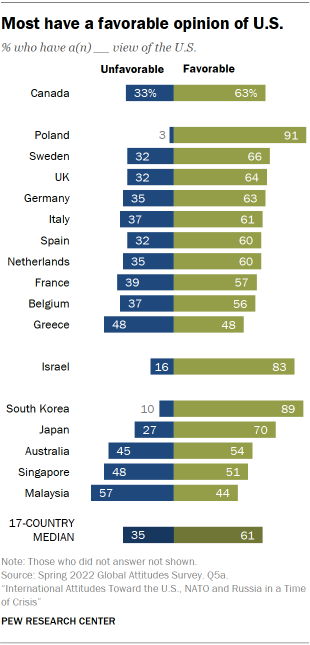
After all-time low ratings in many countries in 2020 and a sharp recovery in 2021, ratings of the U.S. remain high this year. A median of 61% across the 17 countries surveyed have a favorable view of the U.S., while only 35% have an unfavorable view.
In Poland and Israel, where more than eight-in-ten have a positive assessment of the U.S., this is the first time Pew Research Center has surveyed since the coronavirus outbreak and the end of Trump’s presidency. In Poland, ratings of the U.S. are now at a record high.
Nearly nine-in-ten also have a positive view of the U.S. in South Korea, a 12 percentage point increase since 2021, and the largest uptick in positive ratings since the previous year. Positive opinion has increased in only two other countries since 2021: Sweden (+9 points) and Australia (+7 points).
Views of the U.S. have stayed about the same in roughly half the countries surveyed in both 2021 and 2022, but have dropped since last year in Greece (-15 points), Italy (-13 points) and France (-8 points).
Publics in Singapore and Greece are roughly split in their views. Malaysia is the only country surveyed where a majority has a negative opinion of the U.S.
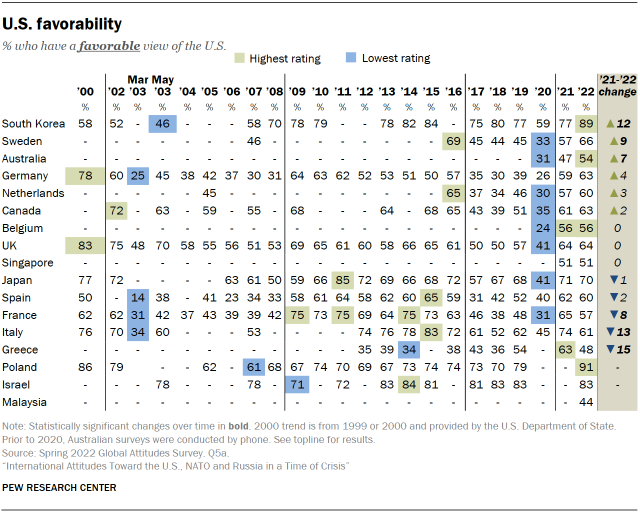
As we have seen consistently in Pew Research Center surveys, people who place themselves on the right of the ideological spectrum tend to view the U.S. more favorably than those on the left. For instance, in Greece, 60% of those on the right have a favorable view of the U.S., compared with only 22% of those on the left. This pattern can also be seen in Australia, the Netherlands, Sweden, the UK, Canada, Israel, Spain, South Korea, France and Belgium. (Ideology is not asked in Japan, Malaysia or Singapore.)
Key allies say the U.S. is a reliable partner to their country
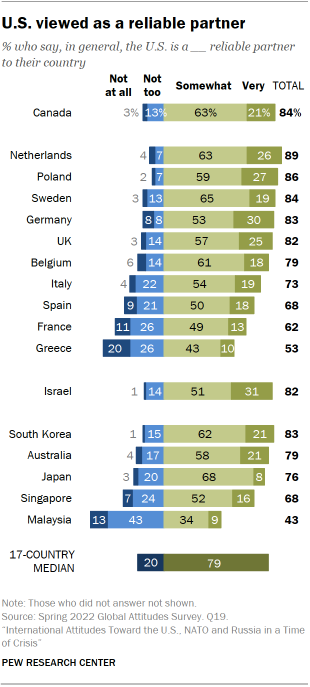
A median of 79% across the 17 countries surveyed say that the U.S. is a reliable partner to their country. Still, a median of just 19% say the U.S. is a very reliable partner. The share of the public who consider the U.S. a very reliable partner is largest in Israel, where 31% hold this view.
The share who says the U.S. is very or somewhat reliable has increased since 2021 in several nations. In South Korea, 83% express this opinion, up 25 points since 2021. Significant increases can also be seen in Sweden (+21 points), Australia (+16 points), Canada (+16 points), Germany (+11 points), Belgium (+10 points), the UK (+10 points), the Netherlands (+9 points) and Spain (+7 points).
In every country, to the extent that people see the U.S. as reliable, they are much more likely to rate the U.S. positively overall. In the Netherlands, for example, among people who say the U.S. is a reliable partner to their country, 65% have a favorable view of the U.S. Among those who say the U.S. is not reliable, only 17% view the U.S. positively.
Majorities say partisan divisions are deep in U.S.
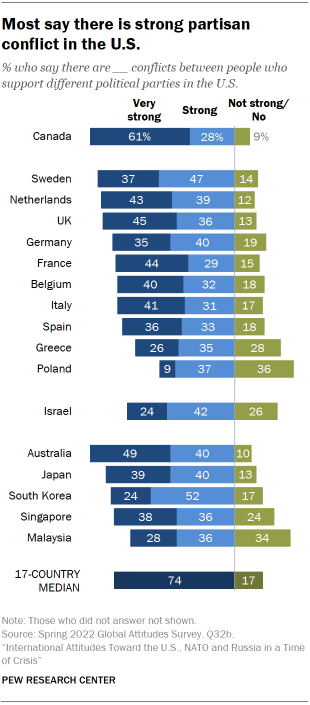
People in the countries surveyed tend to rate the U.S. political system poorly, despite generally positive views of the country overall. For example, in our 2021 survey conducted shortly after the Jan. 6 attack on the U.S. Capitol, people were split over whether the U.S. political system works well or not. Most of those surveyed did not believe that democracy in the U.S. was a good example for other countries to follow. And in a 2017 survey, many people in Canada and Europe said they dislike American ideas about democracy.
In the current survey, a median of 74% across 17 countries say there are strong or very strong conflicts between people who support different political parties in the U.S. In seven nations, four-in-ten or more see very strong partisan conflicts in the U.S. Almost half in Australia and 61% in Canada see intense partisan divisions.
Few people see only weak conflicts or no conflicts at all when it comes to party differences in the U.S., but it is notable that the share of people who did not respond to this question is relatively high in some countries, including as many as 18% in Poland.
Americans agree with others around the world that there are strong partisan conflicts in their country. In a 2021 survey, the U.S., along with South Korea, had the largest share of the public saying there were strong conflicts between people who support different political parties in their own society.
People who say there are very strong partisan conflicts in the U.S. are less likely than those who say there are not very strong conflicts to see the U.S. favorably in 12 countries. This difference is largest in Sweden: Among those who say there are not very strong conflicts (including strong, not strong and no conflicts at all), 75% have a favorable view of the U.S. Among those who say there are very strong partisan conflicts in the U.S., only 53% have a positive opinion of the country. Smaller differences in the same direction can be seen in Australia, the Netherlands, Canada, Malaysia, Italy, South Korea, Greece, Spain, Germany, France and Singapore.
Many favorable on U.S. withdrawal from Afghanistan, yet say the withdrawal was poorly handled
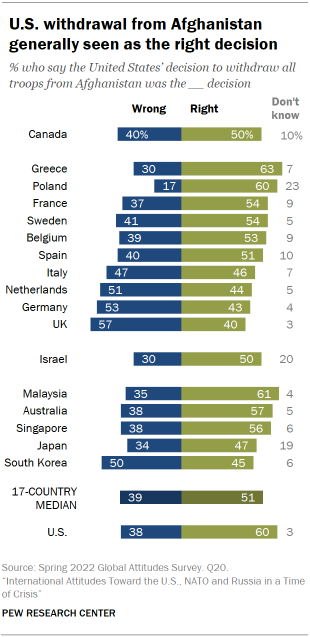
The U.S. decision to withdraw all American troops from Afghanistan in August 2021 is generally seen as having been the right decision. A median of 51% across 17 countries say this action was the right choice, compared with a median of 39% who say it was the wrong choice. In a few places, though, roughly one-in-five do not offer an opinion.
Half of Canadians feel the American decision to withdraw troops was the right one, while 40% say it was the wrong one.
In Europe, views of the withdrawal are more positive than negative. Half or more in six of the 10 nations surveyed feel favorably toward the U.S. withdrawal from Afghanistan. Views are split in Italy, while half or more are negative on the withdrawal in the Netherlands, Germany and the UK.
Half of Israelis say the U.S. troop withdrawal was the right decision, while 30% say it was the wrong decision and 20% do not offer an opinion.
Across the Asia-Pacific publics surveyed, views of the U.S. exit of Afghanistan are slightly more positive overall than in Europe. Majorities in Malaysia, Australia and Singapore look favorably on the decision. While 47% say the withdrawal was a good choice in Japan, 19% do not offer a view either way. And opinion is split in South Korea: 45% say the withdrawal was the right choice and 50% say it was the wrong choice.
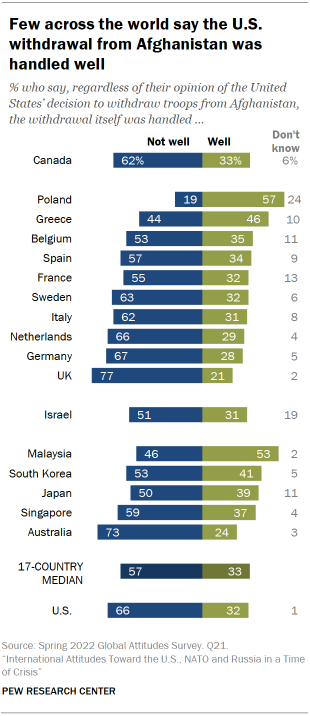
Americans generally approve of the decision to withdraw U.S. troops from Afghanistan: 60% say this was the right decision. Democrats and Democratic-leaning independents (78%) are much more likely than Republicans and GOP leaners (39%) to hold this view.
Despite generally supportive views of the U.S. withdrawal of troops from Afghanistan, public opinion in the countries surveyed is less positive on how the withdrawal was handled. A median of 57% across the 17 countries polled say the withdrawal was not handled well, compared with a median of 33% who say it was handled well. Only in two countries do half or more feel favorably toward the handling of the U.S. exit from Afghanistan: Poland and Malaysia.
In Canada and Europe, views of how the American withdrawal was handled are more negative than positive. About six-in-ten Canadians and majorities in seven of the 10 European countries polled feel negatively toward the handling of the withdrawal, including two-thirds or more in Germany (67%) and the UK (77%).
Israelis view the U.S. handling of the withdrawal from Afghanistan more unfavorably than favorably: 51% say it was not handled well, compared with 31% who say it was handled well (19% did not offer an opinion).
In the Asia-Pacific region, negative views of how the U.S. dealt with its troop withdrawal range from 46% in Malaysia to 73% in Australia.
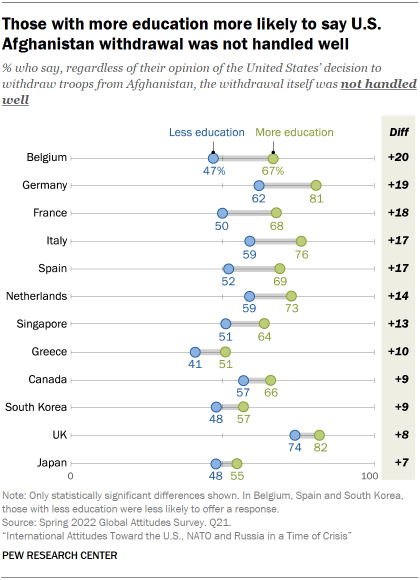
Again, American views look similar to those in other parts of the world. Only around a third of Americans say the withdrawal from Afghanistan was handled well, though this share is higher among Democrats (46%) than Republicans (15%).
Those with more education (postsecondary degree or above) are more likely to say the U.S. withdrawal from Afghanistan was not handled well, compared with those with less education (secondary or below) in most countries surveyed. In Belgium, for example, those with more education are 20 percentage points more likely to have a negative view than those with less education.
Less confidence in Biden in his second year as president
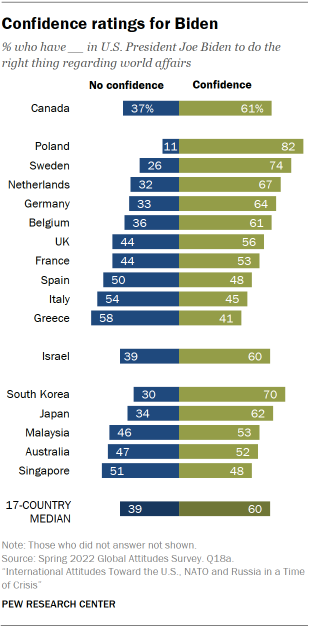
Along with a positive opinion of the U.S., most in the nations surveyed also have trust in the U.S. president. A median of 60% across 17 countries have confidence in Biden to do the right thing in world affairs.
Poles stand out for their particularly high trust in Biden (82%). Not only is it higher than any other country in the current survey, but it is also a record high for trust in the U.S. president in Poland. The last time this question was asked in 2019, 51% of Poles had confidence in Trump’s handling of international affairs. The previous high was in 2015, when 64% expressed confidence in Obama.
People in Sweden, South Korea, the Netherlands and Germany also have relatively high levels of confidence in Biden to do the right thing on the international stage. But not all countries have positive ratings of the U.S. president: Half or more lack confidence in Biden in Spain, Singapore, Italy and Greece.
While still relatively high in most places, trust in the U.S. president has dropped sharply since 2021 in nearly every country surveyed. Some initial excitement about a new president may wane after their first year, but the decrease in trust since 2021 is much larger than any small dips Obama saw in 2010 or 2011 in the same countries.
Despite double-digit decreases in most countries, confidence in the U.S. president is nowhere near the lowest it has been in the past. (The exception is Singapore, which was surveyed for the first time last year.) Ratings for Biden are still higher than those for Trump or Bush in every country except Israel.
Israeli views about U.S. presidents have often differed from attitudes in Europe and the Asia-Pacific region. In most other countries polled, confidence in the U.S. president was highest while Obama was in office and lowest during Trump’s administration. In Israel, Obama received both the highest (2014) and lowest (2011 and 2015) ratings. Confidence in Trump was similar, if somewhat higher, than trust in Obama.
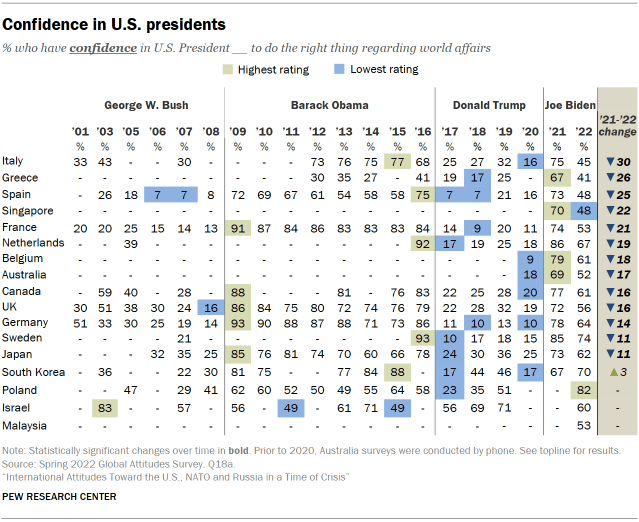
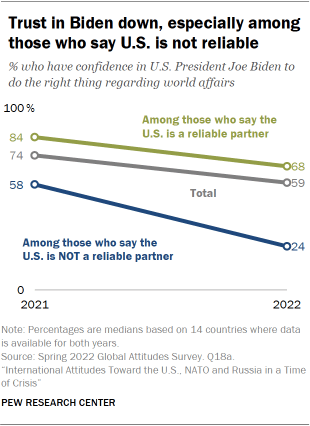
Changes in confidence over time are related to perceptions of America’s reliability as a partner. While most groups have shown a decrease in trust in Biden since 2021, the change is largest among people who think the U.S. is not a reliable partner to their country. Across the 14 countries surveyed in both 2021 and 2022, confidence in Biden has plummeted among those who think the U.S. is not reliable, from a median of 58% in 2021 to just 24% now. But among those who say the U.S. is reliable, the drop in confidence in the U.S. president is much smaller, from a median of 84% in 2021 to 68% in the current survey.
In every country except Germany, confidence in Biden to do the right thing in world affairs is much lower among people who think America’s withdrawal from Afghanistan was handled poorly. For example, among Canadians who think the withdrawal was handled well, 75% trust Biden when it comes to international affairs. Among Canadians who think the withdrawal was not handled well, only 54% trust Biden.




